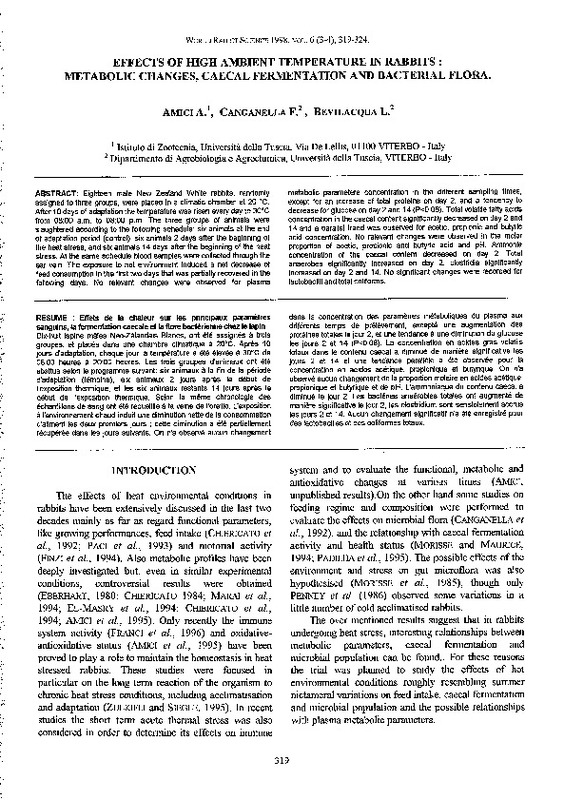JavaScript is disabled for your browser. Some features of this site may not work without it.
Buscar en RiuNet
Listar
Mi cuenta
Estadísticas
Ayuda RiuNet
Admin. UPV
EFFECTS OF HIGH AMBIENT TEMPERATURE IN RABBITS : METABOLIC CHANGES, CAECAL FERMENTATION AND BACTERIAL FLORA
Mostrar el registro sencillo del ítem
Ficheros en el ítem
| dc.contributor.author | Amici, A.
|
|
| dc.contributor.author | Canganella, F.
|
|
| dc.contributor.author | Bevilacqua, L.
|
|
| dc.date.accessioned | 2011-03-14T12:14:53Z | |
| dc.date.available | 2011-03-14T12:14:53Z | |
| dc.date.issued | 1998 | |
| dc.identifier.issn | 1257-5011 | |
| dc.identifier.uri | http://hdl.handle.net/10251/10323 | |
| dc.description.abstract | [EN] Eighteen male New Zealand White rabbits, randomly assigned to three groups, were placed in a climatic chamber at 20 ºC. After 1 O days of adaptation the temperature was risen every day to 30ºC from 08:00 a.m. to 08:00 p.m. The three groups of animals were slaughtered according to the following schedule: six animals at the end of adaptation period (control), six animals 2 days after the beginning of the heat stress, and six animals 14 days after the beginning of the heat stress. At the same schedule blood samples were collected through the ear vein. The exposure to hot environment induced a net decrease of feed consumption in the first two days that was partially recovered in the following days. No relevan! changes were observed for plasma metabolic parameters concentration in the different sampling times, except for an increase of total proteins on day 2, and a tendency to decrease for glucose on day 2 and 14 (P<0.08). Total volatile fatty acids concentration in the caecal content significantly decreased on day 2 and 14 and a parallel trend was observed for acetic, propionic and butyric acid concentration. No relevan! changes were observed in the molar proportion of acetic, propionic and butyric acid and pH. Ammonia concentration of the caecal content decreased on day 2. Total anaerobes significantly increased on day 2, clostridia significantly increased on day 2 and 14. No significan! changes were recorded for lactobacilli and total coliforms. | es_ES |
| dc.description.abstract | [FR] Dix-huit lapins males Neo-Zélandais Blancs, ont été assignés a trois groupes, et placés dans une chambre climatique a 20ºC. Apres 10 jours d'adaptation, chaque jour la température a été élevée a 30ºC de 08:00 heures a 20:00 heures. Les trois groupes d'animaux ont été abattus selon le programme suivant: six animaux a la fin de la période d'adaptation (témoins), six animaux 2 jours apres le début de l'exposition thermique, et les six animaux restants 14 jours apres le début de l'exposition thermique. Selon la mame chronologie des échantillons de sang ont été recueillis a la veine de l'oreille. L'exposition a l'environnement chaud induit une diminution nette de la consommation d'aliment les deux premiers jours ; cette diminution a été partiellement récupérée dans les jours suivants. On n'a observé aucun changement dans la concentration des parametres métaboliques du plasma aux différents temps de prélevement, excepté une augmentation des protéines totales le jour 2, et une tendance a une diminution du glucose les jours 2 et 14 (P<0.08). La concentration en acides gras volatils totaux dans le contenu caecal a diminué de maniere significative les jours 2 et 14 et une tendance parallele a été observée pour la concentration en acides acétique, propionique et butyrique. On n'a observé aucun changement de la proportion molaire en acides acétique, propionique et butyrique et de pH. L'ammoniaque du contenu caecal a diminué le jour 2. Les bactéries anaérobies totales ont augmenté de maniere significative le jour 2, les clostridium sont sensiblement accrus les jours 2 et 14. Aucun changement significatif n'a été enregistré pour des lactobacilles et des coliformes totaux. | |
| dc.description.sponsorship | Research supported by National Research Council of Italy, Special Project RAISA, Sub-project no. 3 | |
| dc.language | Inglés | es_ES |
| dc.publisher | World Rabbit Science. ICTA. UPV | es_ES |
| dc.relation.ispartof | World Rabbit Science | |
| dc.rights | Reserva de todos los derechos | es_ES |
| dc.title | EFFECTS OF HIGH AMBIENT TEMPERATURE IN RABBITS : METABOLIC CHANGES, CAECAL FERMENTATION AND BACTERIAL FLORA | es_ES |
| dc.type | Artículo | es_ES |
| dc.date.updated | 2011-03-14T11:50:03Z | |
| dc.identifier.doi | 10.4995/wrs.1998.363 | |
| dc.rights.accessRights | Abierto | es_ES |
| dc.description.bibliographicCitation | Amici, A.; Canganella, F.; Bevilacqua, L. (1998). EFFECTS OF HIGH AMBIENT TEMPERATURE IN RABBITS : METABOLIC CHANGES, CAECAL FERMENTATION AND BACTERIAL FLORA. World Rabbit Science. 6(3-4):319-324. https://doi.org/10.4995/wrs.1998.363 | es_ES |
| dc.description.accrualMethod | SWORD | es_ES |
| dc.relation.publisherversion | https://doi.org/10.4995/wrs.1998.363 | |
| dc.description.upvformatpinicio | 319 | |
| dc.description.upvformatpfin | 324 | |
| dc.description.volume | 6 | |
| dc.description.issue | 3-4 | |
| dc.identifier.eissn | 1989-8886 | es_ES |
| dc.contributor.funder | Consiglio Nazionale delle Ricerche, Italia |








